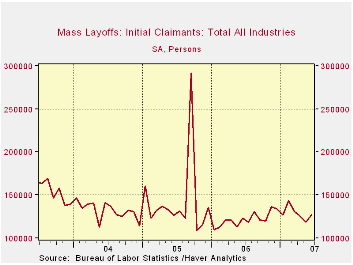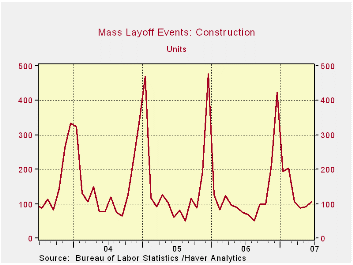 Global| Jul 23 2007
Global| Jul 23 2007Mass Layoffs Creep Higher
by:Tom Moeller
|in:Economy in Brief
Summary
The number of mass layoff events rose 8.0% during June. The increase reversed al of the prior months 6.2% decline, according to BLS data.These specific layoff incidents are called "mass layoffs" because they involve 50 or more [...]

The number of mass layoff events rose 8.0% during June. The increase reversed al of the prior month’s 6.2% decline, according to BLS data.These specific layoff incidents are called "mass layoffs" because they involve 50 or more initial claims for unemployment insurance.
The June increase only left the number of mass layoff events in the middle of the data’s very recent range, however, there is an upward creep to the number since early last year. Since January ’06 mass layoffs are up 16.9% and since last year’s average June layoffs were up 5.8%. 
The increase brought with a 5.0% increase in initial claims for unemployment insurance versus last year’s average.
Most of the creep is due to layoffs in the construction industry which still are running double the monthly low in 2006. That’s after the huge seasonal spikes early this year and last that never seemed to fully unwind in the spring. [Note that all of the data for individual industries are not seasonally adjusted.]
These mass layoff data are contained in Haver's flagship database, USECON. Data are also available by Census regions, divisions and states, including some industry detail for each. These are all carried in the REGIONAL database.
The Minutes of the Federal Open Market Committee Meeting held June 27-28, 2006 can be found here.
| Mass Layoffs, SA | June | May | June ‘06 | Monthly Averages|||
|---|---|---|---|---|---|---|
| 2006 | 2005 | 2004 | ||||
| Number of Events | 1,219 | 1,182 | 1,130 | 1,152 | 1,305 | 1,323 |
| Initial Claims (Number Persons) |
127,897 | 118,414 | 123,558 | 121,839 | 143,402 | 131,943 |
Tom Moeller
AuthorMore in Author Profile »Prior to joining Haver Analytics in 2000, Mr. Moeller worked as the Economist at Chancellor Capital Management from 1985 to 1999. There, he developed comprehensive economic forecasts and interpreted economic data for equity and fixed income portfolio managers. Also at Chancellor, Mr. Moeller worked as an equity analyst and was responsible for researching and rating companies in the economically sensitive automobile and housing industries for investment in Chancellor’s equity portfolio. Prior to joining Chancellor, Mr. Moeller was an Economist at Citibank from 1979 to 1984. He also analyzed pricing behavior in the metals industry for the Council on Wage and Price Stability in Washington, D.C. In 1999, Mr. Moeller received the award for most accurate forecast from the Forecasters' Club of New York. From 1990 to 1992 he was President of the New York Association for Business Economists. Mr. Moeller earned an M.B.A. in Finance from Fordham University, where he graduated in 1987. He holds a Bachelor of Arts in Economics from George Washington University.
More Economy in Brief
 Global| Feb 05 2026
Global| Feb 05 2026Charts of the Week: Balanced Policy, Resilient Data and AI Narratives
by:Andrew Cates






